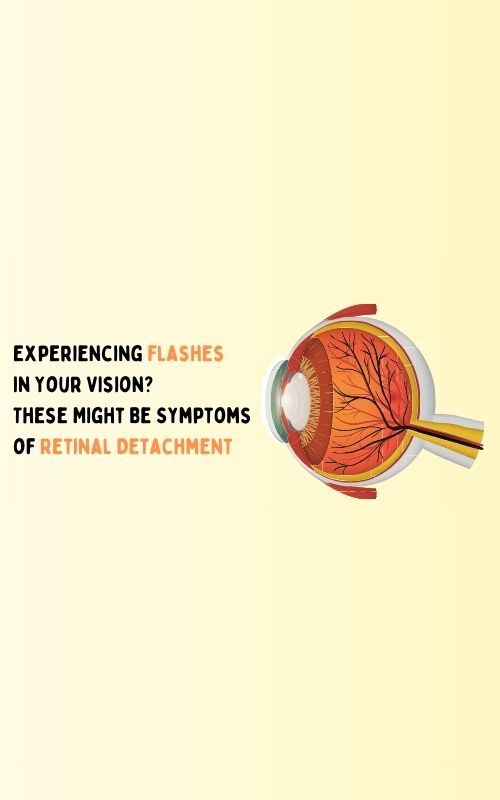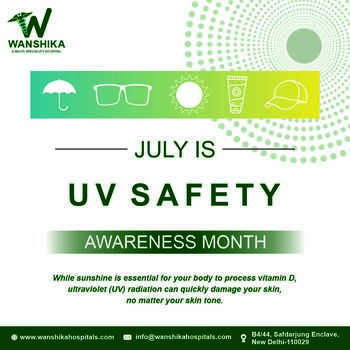Experiencing Flashes in Your Vision? These Might Be Symptoms of Retinal Detachment
Have you ever experienced sudden flashes of light or an increase in floaters? Seeing rare flashlights isn't a concern anymore. But frequent flashes in your peripheral vision, like lightning streaks, or bright spots, need immediate attention.
This could be a sign of retinal Detachment. Did you know that nearly 1 in 10,000 people experience retinal Detachment each year? If left untreated, it might cause permanent eyesight loss.
No worries. We have listed the symptoms, risks, and treatments of this serious condition so you can protect your vision. If you ever notice such changes in your vision, look for an eye specialist near me open now to provide immediate care. Read on to learn more!
Retinal Detachment- what was it?
Retinal Detachment is a serious yet painless condition. The retina is a light-sensitive layer of tissue at the rear of your eye. It separates from the supportive tissue that nourishes it. This detachment interrupts the flow of oxygen and nutrients to the retina.

If prompt action isn't taken, it can lead to significant vision loss. An early consultation with an ophthalmologist or retina specialist can help you treat it immediately. Browse experienced eye specialists near me to get the best care for your vision.
Symptoms of Retinal Detachment
Identifying the signs of retinal Detachment is crucial for early intervention. Symptoms can often appear and a few are listed below:
1. Photopsia (Flashes of Light): this is the most common symptom. Experiencing quick, sudden flashes of light in your vision. It is similar to seeing stars after being hit on the head.
2. Excessive Floaters: Noticing a sudden increase in floaters. These are small, dark shapes that drift across your vision. These might look like flecks, threads, or cobwebs. These are caused by clumping of the vitreous gel inside your eye.
3. Peripheral Vision Loss: A gradual darkening or shadowing of side (peripheral) vision. It is often described as a curtain or shadow moving over your field of vision.
4. Blurred Vision: Vision may become blurred or less sharp.
5. Darkening of Vision: A shadow or dark curtain effect covering part of your visual field. It can spread as the Detachment progresses.
Once you notice any of these symptoms, go for an immediate eye checkup. Ask your neighbors and friends about where I can find a good eye hospital near me to get valuable recommendations.
Treatment options for retinal Detachment
Prompt treatment is vital to preserve vision. Several surgical options are available to treat retinal Detachment, depending on the severity and location of the Detachment:
1. Pneumatic Retinopexy:
Pneumatic Retinopexy is best suited for small and uncomplicated retinal tears. It involves injecting a small gas bubble into the eye. This bubble presses against the retina and closes the tear. A laser or cryopexy device is then used to seal the tear. The body gradually absorbs the fluid that has collected under the retina. It let the retina to reattach.
2. Scleral Buckle:
A silicon band is sewn around the sclera (the white part of the eye) to push the retina back into place. The band is invisible and remains permanently to support the retina.
3. Vitrectomy:
It is preferred for large or severe detachments. This treatment involves removing the vitreous gel from the eye and replacing it with a gas bubble or oil to push the retina back into place. This procedure has a high success rate of 80-90%.
Alternative Therapies
For those seeking less invasive options, there are two primary alternative therapies:
1. Laser Photocoagulation - A laser is used to burn the area around the retinal tear. It creates a scar that seals the tear or reattaches the detached portion.
2. Cryotherapy - Cryotherapy uses a freezing probe to apply cold therapy to the tear. It creates scar tissue that secures the retina.
Risk Factors for Retinal Detachment
Several factors can increase your risk of retinal Detachment. Most eye hospital emergency departments take necessary action to spread awareness of retinal Detachment. Following are the crucial risk factors you have to consider:
Aging: The risk increases as you age, particularly for those over 50.
Severe Eye Injury: Trauma to the eye can lead to retinal Detachment.
Family History: A hereditary predisposition can increase your risk.
High Myopia (Severe Nearsightedness): Those with high myopia are at greater risk due to the elongated shape of their eyes.
Previous Cataract Surgery: Past surgeries, especially cataract removal, can increase the likelihood.
History of Retinal Tears: Previous retinal tears can lead to Detachment.
Certain Eye Disorders: Conditions like posterior vitreous Detachment or diabetes-related retinopathy can contribute to the risk.
Bottom line
Retinal Detachment is a serious eye condition that requires instant medical attention. Don't ignore the signs! Early diagnosis and treatment are crucial for preserving your sight.
Wanshika Hospital is one of the Best eye hospitals in Delhi. We deliver excellent care to address all eye-related issues. Our eye specialists have proven experience in Ophthalmology and provide world-class advanced treatments.












